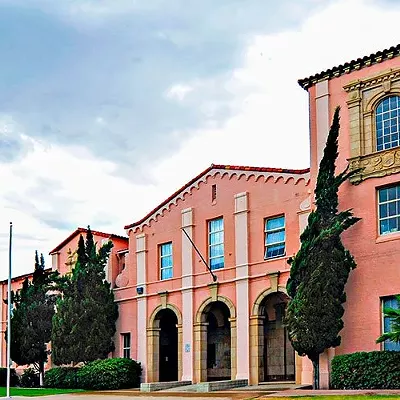Friday, December 29, 2017
Mexican American Studies: What's Next?
It was September 2011, months before the Tucson Unified school board buckled under the weight of unrelenting political and financial pressure and voted to dismantle Mexican American Studies. Then-Attorney General Tom Horne, the man who started the anti-MAS crusade when he was Superintendent of Public Instruction, was part of a panel discussion on the TUSD program sponsored by the Arizona Mainstream Project. A press release for the event described what it called MAS's "real objectives."
On Wednesday, U.S. District Judge Wallace Tashima declared that the law, § 15-112, designed to destroy TUSD's Mexican American Studies, cannot be enforced, because it
This judgement is a triumph of our legal system over racism and its use by cynical politicians. At the end of a year when racism and anti-semitism have turned mainstream, condoned by our president and echoed by venal politicians and street mobs, Judge Tashima's unambiguous condemnation of the motivations behind § 15-112 is a breath of fresh air.
Now the question is, what's next?
I would love to see us hop in a wayback machine and reconstruct the MAS program as it was before it was taken apart in 2012, staff and all. It was far from perfect. As a teacher with 30-plus years in public school classrooms and a student of U.S. education, I have never seen a perfect educational program. But it was pretty damn good, a successful program taught and administered by a group of dedicated educators. However, that's not going to happen. There's no way to bring the band back together. The staff members have scattered and factionalized.
It's unlikely we'll get the old program with a new staff either. The current school board still has two of its original anti-MAS members, Mark Stegeman and Michael Hicks. The recently elected Rachel Sedgwick is a bit of a wild card on this particular issue, but I don't see her as someone who would support a reinstatement of the MAS program.
Currently, TUSD has a "Culturally Relevant" curriculum which was constructed to fulfill the district's need for multicultural courses while avoiding anything that might rattle the cages of the Arizona legislature and the Department of Education. With Judge Tashima's decision, the curriculum can be modified without fear of state intervention if the district decides to. Books which were banned from classroom use after MAS was dismantled can be brought back. Some of the bolder parts of the earlier curriculum can return as well.
One thing that's certain is, this issue won't fade away any time soon. The future of the district's ethnic studies program is sure to become a big deal once again. The community is filled with passionate supporters of the old MAS program, as well as equally passionate detractors. The University of Arizona has its own Department of Mexican American Studies which supported MAS and is likely to have strong, publicly stated opinions about what should happen next. The district's board and administration will be forced to confront the issue head on, like it or not. Whether we'll see a relatively orderly transition to a more robust program or a repeat of the rancor and disruption of the last MAS battles remains to be seen.
"[T]hese include the overthrow of our government, ethnic resentment, and the redefining of 'la familia.' The TUSD Mexican-American Ethnic Studies program is widely seen as a 'militant' model to be spread throughout the country."Horne was asked what TUSD could do to comply with then-Education Superintendent John Huppenthal's demands that the program comply with state law. He replied that the district's only option was "to terminate the program."
Horne said the program must be “destroyed,” invoking Cato’s obsessive call for warfare as a punch line, “Carthage must be destroyed.”Horne is an educated man, so he would have understood the implications of his Carthage analogy. Ancient Carthage, on the North African coast, posed an existential threat to Rome during the Punic Wars — think Hannibal and his elephants crossing the Alps in 218 BC. Rome eventually triumphed over the darker-skinned invaders, destroying Carthage completely and selling its remaining population into slavery. The comparison of Carthage invading from the south being driven back and destroyed by a lighter skinned civilization, to white Arizona fighting off the invasion of its education system by Mexican American radicals is too obvious, and too racist, to be coincidental.
On Wednesday, U.S. District Judge Wallace Tashima declared that the law, § 15-112, designed to destroy TUSD's Mexican American Studies, cannot be enforced, because it
"was enacted and enforced, not for a legitimate educational purpose, but for (i) an invidious discriminatory racial purpose, and (ii) a politically partisan purpose – to shut down the TUSD MAS Program – in violation of the First and Fourteenth Amendments to the Constitution."It's a fitting irony that the tactics used by Tom Horne and John Huppenthal against MAS were repudiated in a court of law while both men have seen their reputations tarnished — one could even say, destroyed — because of a string of personal and professional improprieties compounded by their publicly exposed racism.
This judgement is a triumph of our legal system over racism and its use by cynical politicians. At the end of a year when racism and anti-semitism have turned mainstream, condoned by our president and echoed by venal politicians and street mobs, Judge Tashima's unambiguous condemnation of the motivations behind § 15-112 is a breath of fresh air.
Now the question is, what's next?
I would love to see us hop in a wayback machine and reconstruct the MAS program as it was before it was taken apart in 2012, staff and all. It was far from perfect. As a teacher with 30-plus years in public school classrooms and a student of U.S. education, I have never seen a perfect educational program. But it was pretty damn good, a successful program taught and administered by a group of dedicated educators. However, that's not going to happen. There's no way to bring the band back together. The staff members have scattered and factionalized.
It's unlikely we'll get the old program with a new staff either. The current school board still has two of its original anti-MAS members, Mark Stegeman and Michael Hicks. The recently elected Rachel Sedgwick is a bit of a wild card on this particular issue, but I don't see her as someone who would support a reinstatement of the MAS program.
Currently, TUSD has a "Culturally Relevant" curriculum which was constructed to fulfill the district's need for multicultural courses while avoiding anything that might rattle the cages of the Arizona legislature and the Department of Education. With Judge Tashima's decision, the curriculum can be modified without fear of state intervention if the district decides to. Books which were banned from classroom use after MAS was dismantled can be brought back. Some of the bolder parts of the earlier curriculum can return as well.
One thing that's certain is, this issue won't fade away any time soon. The future of the district's ethnic studies program is sure to become a big deal once again. The community is filled with passionate supporters of the old MAS program, as well as equally passionate detractors. The University of Arizona has its own Department of Mexican American Studies which supported MAS and is likely to have strong, publicly stated opinions about what should happen next. The district's board and administration will be forced to confront the issue head on, like it or not. Whether we'll see a relatively orderly transition to a more robust program or a repeat of the rancor and disruption of the last MAS battles remains to be seen.
Tags: Tucson Unified School District , Mexican American Studies , Tom Horne , John Huppental , U.S. District Judge Wallace Tashima













